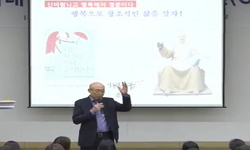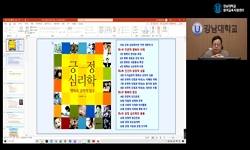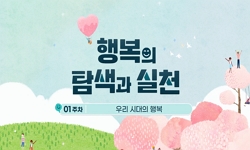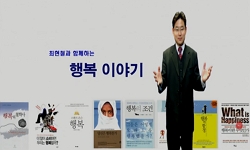본 연구는 한국 여성들이 세대에 따라 느끼는 행복 수준을 비교해 보고, 각 연령에서 행복과 관련 있는 변인들은 어떠한 것이 있는지를 알아보았다. 본 연구에서는 주관적 안녕감 척도를 사...
http://chineseinput.net/에서 pinyin(병음)방식으로 중국어를 변환할 수 있습니다.
변환된 중국어를 복사하여 사용하시면 됩니다.
- 中文 을 입력하시려면 zhongwen을 입력하시고 space를누르시면됩니다.
- 北京 을 입력하시려면 beijing을 입력하시고 space를 누르시면 됩니다.

한국 여성의 연령별 행복수준 비교와 관련 변인들 = Differences of Subjective Well-Being (SWB) and Variables Related to SWB Among Generations in Korean Women
한글로보기부가정보
국문 초록 (Abstract)
본 연구는 한국 여성들이 세대에 따라 느끼는 행복 수준을 비교해 보고, 각 연령에서 행복과 관련 있는 변인들은 어떠한 것이 있는지를 알아보았다. 본 연구에서는 주관적 안녕감 척도를 사용하여 행복 수준을 비교하였고, 행복 관련 변인들로는 우울, 불안, 자아존중감, 사회비교, 촉진/예방조절전략, 종합적 사고, 물질주의, 지능변화 신념, 가정 월소득과 종교유무를 살펴보았다. 20대에서 60대 이상의 여성을 대상으로 총 1,497부의 자료를 최종 분석에 사용하였다. 분석 결과, 20대 여성의 행복감이 가장 높았고, 다음으로 60대가 높은 수준의 행복을 보였다. 반대로 가장 낮은 행복 수준을 보인 세대는 30대 여성으로 나타났다. 행복감이 높을수록 전 연령대에서 자아존중감은 높은 반면 우울, 불안, 예방조절 전략은 낮은 상관을 보였다. 본 연구가 한국 여성들의 개인적/사회적 상황이 고려된 행복증진의 정보를 제공할 수 있기를 기대한다.
다국어 초록 (Multilingual Abstract)
The current study examines the level of SWB in Korean women from the age of 20 to over 60 and the variables related to SWB in each generation. Data were collected from a total of 1497 women in their twenties and over sixties. The variables examined we...
The current study examines the level of SWB in Korean women from the age of 20 to over 60 and the variables related to SWB in each generation. Data were collected from a total of 1497 women in their twenties and over sixties. The variables examined were depression, anxiety, self-esteem, social comparison, focus strategies, holistic thinking, materialism, intelligence-change belief, income and religion. The result showed a U-shaped distribution of SWB, indicating that those in their twenties were the happiest, while those in their sixties expressed a lower level of happiness and those in their thirties had the lowest level. The variables relating to SWB in all the generations were high self-esteem, low depression, low anxiety, and low prevention focus strategy. The implications for each generation of these results are discussed.
목차 (Table of Contents)
- 〈국문초록〉
- 1. 서론
- 2. 이론적 배경
- 3. 방법
- 4. 결과 분석
- 〈국문초록〉
- 1. 서론
- 2. 이론적 배경
- 3. 방법
- 4. 결과 분석
- 5. 논의 및 결론
- 참고문헌
- 〈Abstract〉
참고문헌 (Reference)
1 구교준, "행복에 대한 이론적 고찰" 정부학연구소 21 (21): 95-130, 2015
2 김경미, "행복과 학업성취: 대학생을 중심으로" 한국문화및사회문제심리학회 20 (20): 329-346, 2014
3 김명소, "한국인의 행복한 삶에 대한 인구통계학적 특성별 분석" 한국심리학회 22 (22): 1-33, 2003
4 신승배, "한국인의 행복감 결정요인" 사회과학연구원 41 (41): 183-208, 2015
5 구재선, "한국인의 행복 경험에 대한 토착문화심리학적 접근" 한국문화및사회문제심리학회 12 (12): 77-100, 2006
6 구재선, "한국인, 누가 언제 행복한가?" 한국사회및성격심리학회 25 (25): 143-166, 2011
7 유설희, "학령 후기 아동의 또래관계가 주관적 안녕감에 미치는 영향 : 자아존중감의 매개적 역할" 이화여자대학교 대학원 2013
8 전겸구, "통합적 한국판 CES-D 개발" 6 (6): 59-76, 2001
9 강이수, "취업 여성의 ‘남편’과 일-가족 문제" 여성학연구소 4 (4): 43-87, 2011
10 양미진, "청소년의 심리내적 요인과 환경적 요인이 정신건강에 미치는 영향" 한국청소년상담복지개발원 14 (14): 63-76, 2006
1 구교준, "행복에 대한 이론적 고찰" 정부학연구소 21 (21): 95-130, 2015
2 김경미, "행복과 학업성취: 대학생을 중심으로" 한국문화및사회문제심리학회 20 (20): 329-346, 2014
3 김명소, "한국인의 행복한 삶에 대한 인구통계학적 특성별 분석" 한국심리학회 22 (22): 1-33, 2003
4 신승배, "한국인의 행복감 결정요인" 사회과학연구원 41 (41): 183-208, 2015
5 구재선, "한국인의 행복 경험에 대한 토착문화심리학적 접근" 한국문화및사회문제심리학회 12 (12): 77-100, 2006
6 구재선, "한국인, 누가 언제 행복한가?" 한국사회및성격심리학회 25 (25): 143-166, 2011
7 유설희, "학령 후기 아동의 또래관계가 주관적 안녕감에 미치는 영향 : 자아존중감의 매개적 역할" 이화여자대학교 대학원 2013
8 전겸구, "통합적 한국판 CES-D 개발" 6 (6): 59-76, 2001
9 강이수, "취업 여성의 ‘남편’과 일-가족 문제" 여성학연구소 4 (4): 43-87, 2011
10 양미진, "청소년의 심리내적 요인과 환경적 요인이 정신건강에 미치는 영향" 한국청소년상담복지개발원 14 (14): 63-76, 2006
11 서경현, "청소년의 삶에 대한 기대와 주관적 웰빙: 일반 성인과의 비교 연구" 한국청소년학회 19 (19): 137-157, 2012
12 유경, "정서 대처 양식과 정서 인식이 장노년기 주관적 안녕감에 미치는 영향" 한국사회및성격심리학회 19 (19): 1-18, 2005
13 윤갑정, "예비보육교사의 목표, 만족도, 자기효능감 및 우울이 행복에 미치는 영향" 한국보육지원학회 8 (8): 113-131, 2012
14 유경, "여성의 행복에 영향을 미치는 요인: 세대 간 분석" 한국사회및성격심리학회 24 (24): 89-104, 2010
15 이현송, "소득이 주관적 삶의 질에 미치는 영향" 23 (23): 91-117, 2000
16 이신영, "성공적 노화 인식에 관한 성별 비교 연구" 여성학연구소 3 (3): 99-130, 2010
17 배지아, "모-자녀 애착 및 공유시간과 자아존중감이 학령 후기 아동의 주관적 안녕감에 미치는 영향" 이화여자대학교 대학원 2014
18 김금미, "대학생의 행복과 자아수용 향상에 영향을 미치는 변인들" 한국상담심리학회 22 (22): 863-883, 2010
19 김민경, "대학생의 우울, 감사 및 낙관성과 행복과의 관계" (사)한국청소년문화연구소 (28) : 7-32, 2011
20 김경미, "대학생의 물질주의와 주관적 안녕감 및 대학생활 만족도의 관계에서 삶의 의미의 매개효과" 한국청소년학회 21 (21): 295-314, 2014
21 윤현숙, "노인의 영성과 종교 활동이 생활만족도와 우울에 미치는 영향" 한국노년학회 30 (30): 1077-1093, 2010
22 권태연, "노년기 연소노인, 중고령노인, 초고령노인 집단의 스트레스 요인과 자아존중감이 우울에 미치는 영향 - 자아존중감 2요인의 매개효과를 중심으로 -" 한국사회복지연구회 40 (40): 163-196, 2009
23 김은정, "기혼 여성의 우울증상과 심리사회적 특성: 3개월 간 추적 연구" 18 (18): 27-39, 1999
24 Baltes, P. B., "Wisdom: A Metaheuristic (Pragmatic) to Orchestrate Mind and Virtue Toward Excellence" 55 : 122-136, 2000
25 Myers, D. G., "Who Is Happy?" 6 : 10-19, 1995
26 Gibert, D. T., "When Comparison Arise" 69 : 227-236, 1995
27 Diener, E., "Wealth and Happiness Across the World: Material Prosperity Predicts Flie Evaluation, Whereas Psychosocial Prosperity Predicts Positive Feeling" 99 : 52-61, 2010
28 Karabati, S., "Values, Materialism, and Well-Being: A Study With Turkish University Students" 31 : 624-633, 2010
29 Diener, E., "The Satisfaction With Life Scale" 49 : 71-75, 1985
30 Lawton, M. P., "The Dimensions of Affective Experience in Three Age Groups" 7 : 171-184, 1992
31 Kinlaw, C. R., "The Development of Children’s Beliefs About Intelligence" 23 : 125-161, 2003
32 Coopersmith, S., "The Antecedents of Self-Esteem" Consulting Psychologists Press 1967
33 Brandstadter, J., "The Aging Self: Stabilizing and Protective Processes" 14 : 52-80, 1994
34 Kim, H., "Status Race and Happiness : What Experimental Surveys Tell Us" Korea Development Institute 2014
35 Moberg, D. O., "Spirituality and Aging : Research and Implications" 20 : 95-134, 2008
36 Rosenberg, M., "Society and the Adolescent Self-Image" Princeton University Press 1965
37 Kawachi, I., "Social Capital, Income Inequality and Mortality" 87 : 1491-1498, 1997
38 전병재, "Self-Esteem: A Test of Its Measurability" 11 : 109-129, 1974
39 Stein, K. F., "Schema Model of the Self Concept" 27 : 187-195, 1995
40 Childs, E., "Religious Attendance and Happiness: Examining Gaps in the Current Literature: A Research Note" 49 : 550-560, 2010
41 Ouschan, L., "Regulatory Focus Strategies Scale: A Measure of Individual Differences in the Endorsement of Regulatory Strategies" 10 : 223-238, 2007
42 Beidel, D. C., "Psychological, Cognitive and Behavioral Aspects of Social Anxiety" 23 : 109-117, 1985
43 Furnham, A., "Personality, Cognitive Ability, and Beliefs About Intelligence as Predictors of Academic Performance" 14 : 49-66, 2003
44 OECD, "OECD Better Life Index"
45 Gallup, "Mood of the Word Upbeat on International Happiness Day"
46 Christopher, A. N., "Materialism and Affect: The Role of Self-Presentational Concerns" 23 : 260-272, 2004
47 Blanchflower, D, G., "Is Well-Being U-Shaped over the Life Cycle?" 66 : 1733-1749, 2008
48 Dorn, D., "Is It Culture of Democracy? The Impact of Democracy and Culture on Happiness" 82 : 505-526, 2007
49 Gibbons, F. X., "Individual Differences in Social Comparison : Development of a Scale of Social Comparison Orientation" 76 : 129-142, 1999
50 Choi, I., "Individual Differences in Analytic versus Holistic Thinking" 22 : 691-705, 2007
51 Easterlin, R., "Income and Happiness: Towards a Unified Theory" 111 : 465-484, 2001
52 Kahneman, D., "High Income Improves Evaluation of Life But Not Emotional Well-Being" 107 : 16489-16493, 2010
53 Van Rijn, J., "Happiness and Religion: A Denominational Perspective" 2008
54 Braten, I., "Epistemoloical Beliefs and Implicit Theories of Intelligence as Predictors of Achievement Goals" 29 : 371-388, 2004
55 Carstensen, L. L., "Emotional Experience in Everyday Life Across the Adult Life Span" 79 : 644-655, 2000
56 Deckop, J. R., "Effects of Materialism on Work-Related Personal Well-Being" 63 : 1007-1030, 2010
57 Labouvie-Vief, G., "Dynamic Integration : Affect, Cognition, and the Self in Adulthood" 12 : 201-206, 2003
58 Kwon, S. M., "Differential Roles of Dysfunctional Attitudes an Attitudes an Automatic Thoughts in Depression: An Integrated Model of Depression" University of Queensland 1992
59 Inglehart, R., "Development, Freedom, and Rising Happiness: A Global Perspective(1981-2007)" 3 : 264-285, 2008
60 Watson, D., "Development and Validation of Brief Measures of Positive and Negative Affect: The PANAS Scales" 54 : 1063-1070, 1988
61 Nisbett, R. E., "Culture and Systems of Thought : Holistic versus Analytic Cognition" 9 : 131-135, 2001
62 White, K., "Culture and Social Comparison Seeking: The Role of Self-Motives" 31 : 232-242, 2005
63 Choi, I., "Causal Attribution Across Cultures: Variation and Universality" 125 : 47-63, 1999
64 Higgins, E. T., "Beyond Pleasure and Pain" 52 : 1280-1300, 1997
65 Diener, E., "Beyond Money: Toward an Economy of Well-Being" 5 : 1-31, 2004
66 Beck, A. T., "An Inventory for Measuring Clinical Anxiety : Psychometric Properties" 56 : 893-897, 1988
67 Dweck, C. S., "A Social-Cognitive Approach to Motivation and Personality" 95 : 256-273, 1988
68 Richins, M. L., "A Consumer Values Orientation for Materialism and Its Measurement: Scale Development and Validation" 19 : 303-316, 1992
69 한민, "60대 한국인의 심리적 특성: 정서, 사고방식, 가치관의 연령대별 비교" 한국노년학회 33 (33): 661-679, 2013
동일학술지(권/호) 다른 논문
-
- 계명대학교 여성학연구소
- 정인경(Chung, In-Kyoung)
- 2016
- KCI등재
-
- 계명대학교 여성학연구소
- 성지혜(Sung, Ji-Hye)
- 2016
- KCI등재
-
고학력 취업여성의 일자리 만족과 생활만족의 결정요인 탐색
- 계명대학교 여성학연구소
- 강영희(Kang, Young-Hee)
- 2016
- KCI등재
-
- 계명대학교 여성학연구소
- 오화영(Oh, Hwa-Young)
- 2016
- KCI등재
분석정보
인용정보 인용지수 설명보기
학술지 이력
| 연월일 | 이력구분 | 이력상세 | 등재구분 |
|---|---|---|---|
| 2026 | 평가예정 | 재인증평가 신청대상 (재인증) | |
| 2020-01-01 | 평가 | 등재학술지 유지 (재인증) |  |
| 2017-01-01 | 평가 | 등재학술지 유지 (계속평가) |  |
| 2014-01-01 | 평가 | 등재학술지 선정 (계속평가) |  |
| 2013-01-01 | 평가 | 등재후보 1차 PASS (등재후보1차) |  |
| 2011-01-01 | 평가 | 등재후보학술지 선정 (신규평가) |  |
학술지 인용정보
| 기준연도 | WOS-KCI 통합IF(2년) | KCIF(2년) | KCIF(3년) |
|---|---|---|---|
| 2016 | 1.5 | 1.5 | 1.38 |
| KCIF(4년) | KCIF(5년) | 중심성지수(3년) | 즉시성지수 |
| 1.34 | 1.35 | 1.992 | 0.15 |




 KCI
KCI DBpia
DBpia







